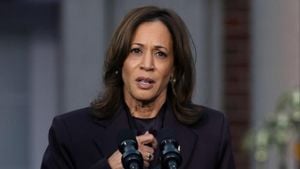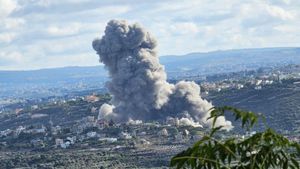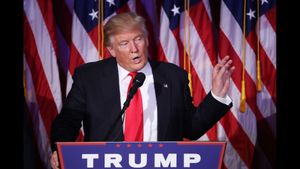Donald Trump’s expected return to the White House as the 47th President of the United States is garnering mixed reactions across the globe, especially among nations traditionally at odds with U.S. foreign policy. With potential conflicts simmering, particularly involving Iran and the complex situation in Israel, analysts are casting worried glances over the Middle East’s geopolitical stability as Trump sets the stage for his second term.
After Trump’s surprising win on November 6, 2024, many nations are grappling with uncertainties. Iranian officials, for example, appeared dismissive of the results, expressing indifference to the electoral outcome. President Masoud Pezeshkian stated, “It does not matter at all who has won the American election,” highlighting the tensions and distrust between Tehran and Washington.
Yet, the core of the Iranian regime's stance remains formidable. Despite their public denial of concern, the Islamic Revolutionary Guard Corps (IRGC) continues to issue threats against Israel. Such statements signal Iran’s potential readiness for confrontation, possibly emboldened by the change in U.S. leadership. These aggressions could escalate as Trump’s administration seeks to redefine its approach to Tehran, especially after intelligence reports indicated Iran had harbored intentions to target Trump during his campaign.
Across the broader region, reactions to Trump’s victory are anything but uniform. Russian President Vladimir Putin congratulated Trump, yet the Kremlin reiterated its view of the U.S. as “an unfriendly country.” State-run media celebrated the election result, with hopes it might lead to reduced U.S. support for Ukraine—perhaps enticing Trump’s administration to reconsider its approach to foreign aid amid the enduring war with Russia. Nevertheless, experts caution against seeing too bright a future, emphasizing Russia’s desire for strategic positioning rather than partnership.
China’s response paints another complex picture. President Xi Jinping called for “win-win” cooperation, advocating stable relations even as Trump has previously threatened substantial tariffs against Chinese policies, especially concerning Taiwan. The cautious optimism perceived by Beijing showcases its desire to navigate the waters of U.S. election outcomes without inciting too much conflict.
Analysis from experts like Behnam Ben Taleblu, Senior Fellow at the Foundation for Defense of Democracies (FDD), points to Iran’s deep-seated fear of Trump's presidency. “Iran must be terrified,” Ben Taleblu states, stressing the urgency for the U.S. to establish a clear counter-policy to address overt threats from the Iranian regime, which has continuously chanted slogans against America and allies.
One significant threat could emerge from the IRGC’s promised retaliatory strikes against Israel following specific attacks attributed to the Israeli military. Statements from high-ranking IRGC officials indicated plans for what they termed as the third “True Promise Operation”—an intended large-scale attack on Israel reminiscent of earlier assaults this year. These sanctions on Iranian missile manufacturing capacity heighten the fear of more calculated but limited attacks, meant to preserve enough military capability for future confrontations.
Meanwhile, as the situation grows tense, regional movements like Hezbollah showcase their readiness to engage. The group has displayed more organized defensive tactics against Israeli advances, claiming to repel forces from seizing territory. Their engagement at the southern Lebanese town of Khiam has been part of this strategic response to Israeli operations.
Interestingly, the military-backed Houthi movement has also weighed in on the U.S. electoral shift. Houthi Supreme Leader Abdulmalik al-Houthi remarked on Trump’s reelection, insisting it would not alter their offensive strategies against merchant shipping or direct assaults on Israel. Their resolve indicates continued strife on multiple fronts involving Western interests.
Yet perhaps one of the most significant aspects of these developments is the humanitarian crisis brewing amid military conflict. Amid increasing violence, protests have erupted across Gaza against rising humanitarian aid prices. The local populace continues to suffer under the weight of military operations, raising alarms about the impact of any future escalations on civilian life.
Israeli operations have ramped up, particularly central and northern regions of Gaza, where the military aims to neutralize threats from Hamas and other militant groups. This has included significant ground operations, targeting launch sites used against Israeli territories, yet the humanitarian impact of these actions reigns heavily.
On all fronts, it’s evident: Trump’s impending second term could usher in dramatic shifts globally. With Iran, Russia, and other actors maintaining firm stances against the U.S., the Middle East remains on edge as analysts and policymakers alike attempt to anticipate, understand, and navigate the possible shifts to come.
Whether Trump's presidency will catalyze conflict or channels diplomacy remains uncertain, but as reactions pour in, one thing is clear: the eyes of the world are drawn to how these complex dynamics will evolve over the coming months. The stakes are high, and the ramifications of Trump’s return could redefine international relations across tumultuous landscapes.



